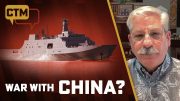
SINGAPORE — In the wake of U.S. House Speaker Nancy Pelosi’s visit to Taiwan in August 2022, observers have noted that it has become Beijing’s “new normal” to punish Taiwan by increased military incursions around Taiwanese waters, ban Taiwanese products from the profitable Chinese market, as well as threaten to invade Taiwan to reunite it with mainland China by force if necessary.
Consequently, analysts have said that Taiwan has to be better prepared for its future vis-à-vis mainland China.
“There is growing concern … that Beijing is moving towards a strategy of weaponizing Taiwan’s economic interdependence with China to increase political pressure,” said Dr. Roy Lee from the Chung-Hua Institution for Economic Research in Taipei.
China is Taiwan’s largest trading partner, with the mainland and Hong Kong comprising 42 percent of Taiwan’s exports in 2021.
“A priority for Taiwan should be to undertake assessments of its investments in China to understand the potential economic security concerns and come up with possible actions to address them,” Lee added.
Recently, China also sanctioned a number of Taiwanese food and beverage imports, citing various reasons.
In 2021, prior to Pelosi’s 2022 visit, China halted the import of Taiwanese pineapples, sugar apples, and wax apples, after mainland officials claimed they had found the presence of pesticides on the fruit.
In June 2022, China suspended imports of grouper fish from Taiwan owing to banned chemicals.
A day after Pelosi landed in Taipei, Chinese customs suspended Taiwanese imports of citrus fruit and some fish products, on the pretext of Covid-19 concerns and pesticides.
However, this move, which Taiwan’s Council of Agriculture estimates will impact exports worth NT$620 million (US$20 million), was generally regarded as retaliation for Pelosi’s visit, as she had been the highest-ranking U.S. official to visit Taiwan in 25 years.
Although agricultural products comprise only 0.6 percent of Taiwan’s exports to China, farmers and businesses in Taiwan have felt the pinch of Chinese trade restrictions.
Beijing’s August ban on pomelos, for instance, caused growers to scramble to find other sales avenues, as the abrupt measure came shortly before the Mid-Autumn Festival when customers buy the fruit as a festive food staple. Although only 10 percent of Taiwan’s pomelos are exported, 95 percent of those exports in 2021 were to mainland China and Hong Kong.
Lee said, “Similarly concentrated export structures can be found for wax apples, citrus fruits and grouper fish, suggesting that these agricultural products have been specifically chosen to maximize their coercive impact.”
The more recent import ban on alcohol covers 11 out of 28 beer and distillery items registered by Taiwanese exporters. China alleged that the affected companies failed to finish the relevant registration paperwork.
“These measures target a sector of Taiwan’s economy with the aim to divide producers — some will retain the export licenses while others will lose them — creating an internal political pressure on Taiwan’s government. They are driven by political motivations,” said Professor Julien Chaisse from the City University of Hong Kong.
In response, Taiwan has plans to take China to the World Trade Organisation (WTO) after the communist country effectively forbade the import of more Taiwanese food and drink products, Taiwanese Premier Su Tseng-chang said as Beijing accused Taipei of political manipulation.
Speaking to reporters, Su said China was using administrative measures to hamper normal trade, measures that fail to adhere to WTO norms. The government will try its utmost to communicate with relevant Chinese departments on the matter, Su added.
“If there is any non-compliance with the relevant WTO norms, we will also follow the relevant channels to file a complaint.”
Taiwan and China are both WTO members.
In a statement, China’s Taiwan Affairs Office claimed that the problem was an administrative one in that the companies impacted were not properly registered and this was a “normal food safety supervision measure.”
The office also said it hoped that Taiwanese companies will provide the necessary information that complies with Beijing’s requirements as soon as possible.
More optimistic observers would say that Chinese sanctions thus far have had limited impact on Taiwan’s economy. After all, Beijing has not interfered with the flow of the island’s most valuable export: semiconductors. The latter are vital components used in items such as smartphones, medical devices, and cars.
“If China really wants to hit Taiwan hard, it will ban or impose quotas on semiconductors,” said Chaisse.
On the military front, Taiwan’s leader Tsai Ing-wen has recently vowed to enhance security cooperation with Japan to maintain freedom in the Indo-Pacific during a meeting with a senior member of Japan’s ruling Liberal Democratic Party (LDP).
Although Japan and Taiwan do not have formal diplomatic relations, they have close, unofficial ties. Moreover, both share concerns about China, particularly its heightened military activities in the region.
During the meeting in Taipei, Tsai thanked Koichi Hagiuda, the LDP’s policy chief, for Japan’s support over issues such as ensuring security in the Taiwan Strait.
“We have seen that in recent years, Taiwan-Japan relations have become ever closer,” Tsai said.
Indeed, while trying to ensure the status quo in the Taiwan Strait (i.e. “No Unification, No Independence and No Use of Force”) by not using confrontational rhetoric, the Taiwanese government is actively bracing for the worst, that is, an all-out war with mainland China.
These preparations entail establishing the All-Out Defense Mobilization Agency for mobilizing reservists in wartime and restarting air-raid drills throughout the island.
To repulse a possible Chinese attack, Taiwan has declared a yearly increase of 14 percent in the defense budget for 2023, increased arms purchases from the United States to boost its anti-ship and air-to-air missile capabilities, and plans to deploy anti-drone defense systems in 45 military bases by 2023. Consequently, Taiwan is now poised to spend more than $19 billion on defense in 2023.
In a recent interview with The Atlantic, Tsai admitted, while referring to the possibility of a Chinese incursion, that “it’s real that this thing could happen to us.”
“So we need to get ourselves ready.”
Also, she highlighted, “There is a genuine threat out there. It’s not hype.”
What is more, Tsai’s stance toward China and the People’s Liberation Army remains resolute, making clear that the Taiwanese “will not be bullied,” and that Beijing should not underestimate their resolve.
“If the PLA wants to do something drastic, Xi has to weigh the costs,” she said. “He has to think twice.”
From Tsai’s viewpoint, it is crucial to remain low-key and unnerved, but simultaneously reinforce Taiwan’s self-defense abilities. During China’s bellicose military activities in August in retaliation for Pelosi’s visit, Tsai maintained what seemed to be an ordinary schedule, participating in a cultural event but also visiting with troops. Tsai said that younger people in Taiwan are calm and resilient.
“They’re not trying to escape.” she said.
However, Tsai has challenges to face domestically. While the ruling Democratic Progressive Party (DPP) is dogged in its opposition to China’s hostile measures, the largest opposition party, Kuomintang (KMT), supports a pacifistic China approach. The DPP aims to protect Taiwan’s sovereignty, whereas the KMT yearns for an eventual reunification with China, as declared by the KMT’s former chair Hung Hsiu-chu.
Such a disparity between the two major parties reached a new peak after Pelosi’s Taiwan Visit, when the KMT insisted on dispatching a peace envoy to China on August 12 amid intensifying Chinese pugilism. On the other hand, the DPP, together with several other political parties, lambasted the KMT’s China stance.
Also, although Taiwan has a 2.5 million man reserve military force, this backup force has been regarded as being inadequately prepared for combat. Moreover, Taiwan’s pool of military conscripts for 2022 is the smallest in 10 years, as the island faces a population crisis owing to falling birth rates.
U.S. Secretary of State Antony Blinken cautioned in October that China may be working on a “much faster timeline” for dealing with Taiwan. U.S. military and intelligence leaders have warned that 2027 could be a potential year for an invasion, on the basis that China’s military modernization will have progressed adequately by then.
The increasing might of China’s military has catalyzed calls for an amendment to Taiwan’s defense priorities. Rather than building large, conventional hardware (airplanes, tanks, submarines), military specialists have advised Taiwan to concentrate on so-called asymmetric capabilities (anti-ship weapons, surface-to-air missiles, stockpiles of small arms and ammunition). That, together with a larger number of civilian reserves, could make the stakes of an invasion too high for China. Such an approach has been dubbed as “the porcupine strategy” in global defense circles.
Hence, according to the same report by The Atlantic, such a possible scenario of a war with China necessitates a delicate balancing act on Tsai’s part: to prepare for war while seeking to avoid it.
With Taiwan playing a key global role in the semiconductor industry, economies across the world could suffer massive shocks if a China-Taiwan war were to happen. Additionally, the United States risks being dragged into its first direct military battle with a nuclear superpower.




